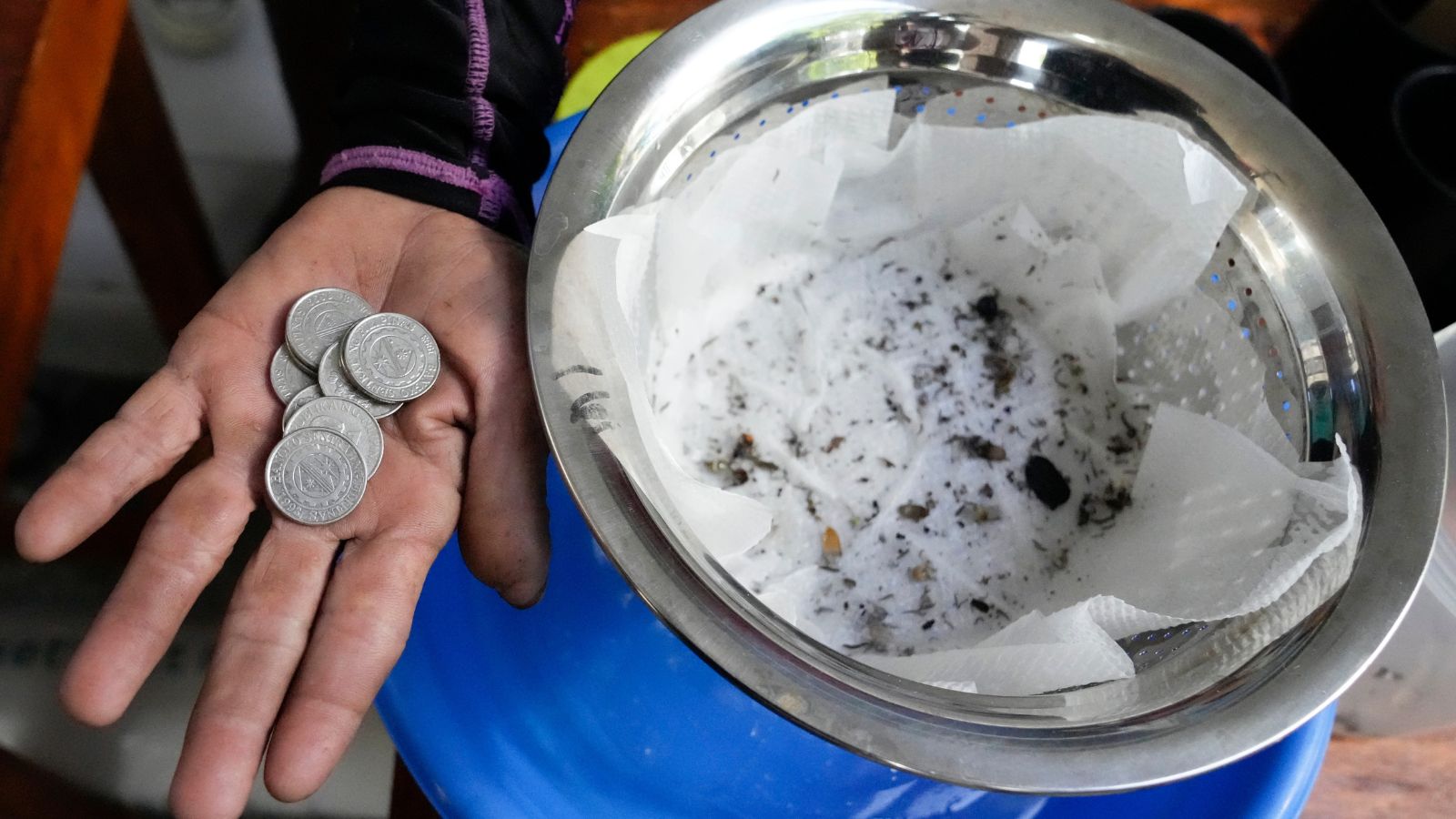Stay updated with the latest - Click here to follow us on Instagram
A village in this country is offering cash bounty for dead mosquitoes
Under the program, residents receive one Philippine peso (just over one cent) for every five mosquitoes or mosquito larvae they turn in.
 Michael Labag shows the 9 pesos reward he got from the 45 mosquito larvas he captured in Mandaluyong city, Philippines as the village started offering bounty for captured mosquitos, dead or alive, as part of an anti-dengue campaign on Wednesday, Feb. 19, 2025. (AP Photo/Aaron Favila)
Michael Labag shows the 9 pesos reward he got from the 45 mosquito larvas he captured in Mandaluyong city, Philippines as the village started offering bounty for captured mosquitos, dead or alive, as part of an anti-dengue campaign on Wednesday, Feb. 19, 2025. (AP Photo/Aaron Favila)
A village in the Philippine capital region has launched an unusual initiative to combat dengue—offering a small cash reward for captured mosquitoes, dead or alive.
Addition Hills village in Mandaluyong City, home to over 100,000 residents, introduced the scheme amid growing concerns over rising dengue cases. The move comes after the nearby city of Quezon declared an outbreak over the weekend, with dengue infections surging in at least eight other areas.
According to health department data, at least 28,234 dengue cases have been recorded in the Philippines as of February 1—a 40% increase from the same period last year. In Quezon City alone, 10 people, mostly children, have died from the mosquito-borne illness out of 1,769 reported cases.
 A resident shows his captured mosquito which he placed inside a plastic cup in Mandaluyong city, Philippines as a village started offering bounty for captured mosquitos, dead or alive, as part of an anti-dengue campaign on Wednesday, Feb. 19, 2025. (AP Photo/Aaron Favila)
A resident shows his captured mosquito which he placed inside a plastic cup in Mandaluyong city, Philippines as a village started offering bounty for captured mosquitos, dead or alive, as part of an anti-dengue campaign on Wednesday, Feb. 19, 2025. (AP Photo/Aaron Favila)
Addition Hills has already undertaken clean-ups, canal de-clogging, and hygiene campaigns to curb dengue. But with local cases rising to 42 this year and two young students dying from the disease, village leader Carlito Cernal felt stronger action was needed.
“There was an alarm,” Cernal told The Associated Press. “I found a way.”
Under the program, residents receive one Philippine peso (just over one cent) for every five mosquitoes or mosquito larvae they turn in.
Critics have warned the scheme could backfire if people start breeding mosquitoes to claim the reward. However, Cernal dismissed those concerns, saying the campaign would end as soon as cases decline.
As the initiative kicked off, a handful of mosquito hunters arrived at the village office. Among them was 64-year-old scavenger Miguel Labag, who turned in a jug containing 45 mosquito larvae and received nine pesos (15 cents).
 Miguel Labag shows a container with mosquito larvas which he caught outside his house in Mandaluyong city, Philippines as their village started offering bounty for captured mosquitos, dead or alive, as part of an anti-dengue campaign on Wednesday, Feb. 19, 2025. (AP Photo/Aaron Favila)
Miguel Labag shows a container with mosquito larvas which he caught outside his house in Mandaluyong city, Philippines as their village started offering bounty for captured mosquitos, dead or alive, as part of an anti-dengue campaign on Wednesday, Feb. 19, 2025. (AP Photo/Aaron Favila)
“This is a big help,” Labag said, smiling. “I can buy coffee.”
Rising Dengue Cases
Dengue, a viral infection found in tropical regions, causes joint pain, nausea, vomiting, and rashes. Severe cases can lead to hemorrhaging, breathing difficulties, and organ failure. While no specific treatment exists, maintaining fluid levels is crucial.
Officials in another Quezon City village are considering an alternative approach—releasing swarms of frogs to feed on mosquitoes.
 A mosquito, captured by a resident, rests inside a glass enclosure with a UV light trap in Mandaluyong city, Philippines as their village started offering bounty for captured mosquitos, dead or alive, as part of an anti-dengue campaign on Wednesday, Feb. 19, 2025. (AP Photo/Aaron Favila)
A mosquito, captured by a resident, rests inside a glass enclosure with a UV light trap in Mandaluyong city, Philippines as their village started offering bounty for captured mosquitos, dead or alive, as part of an anti-dengue campaign on Wednesday, Feb. 19, 2025. (AP Photo/Aaron Favila)
Health Secretary Teodoro Herbosa emphasised the importance of eliminating mosquito breeding grounds and ensuring that anyone with symptoms seeks medical attention. Despite rising infections, the Philippines has kept dengue-related deaths relatively low, he said.
Dengue cases have spiked earlier than expected, months ahead of the rainy season in June. Health Undersecretary Alberto Domingo linked the surge to unseasonal downpours creating stagnant water pools where mosquitoes breed, noting that climate change may be a factor in the shifting weather patterns.
(With Inputs from Associated Press)
- 01
- 02
- 03
- 04
- 05































